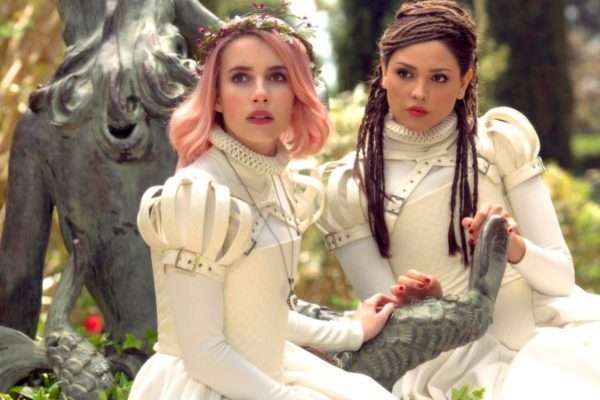
A beautifully maintained island full of young women that need to be “fixed.” A rebellious princess with a tragic past. A fantasy world with a mildly dystopian undercurrent, complete with a financial caste system. This is the world of Paradise Hills, the feature film debut of Alice Waddington.
Starring Emma Roberts as Uma, the film focuses on an exclusive prison-like reform school for girls whose (often wealthy) families want them cured of something. The film begins with an unnecessary bracketing device before flashing back two months as Uma awakens on the island, meets cruel headmistress The Duchess (Milla Jovovich) and then befriends roommates Chloe (Danielle Macdonald) and Yu (Awkwafina).
But it is Armana (Eiza González) who catches Uma’s eye (and vice versa) when the two girls shift from enemies to confidants as they plot to escape the regimented schedule for “proper ladies”, which includes exercise, hair & makeup and repetitive brainwashing videos while riding a horse carousel high in the air. The burgeoning romance between the two provides much of the film’s early narrative focus and there’s a healthy chemistry between González and Roberts, the latter of whom only truly comes alive in these scenes.
Paradise Hills traffics heavily in queer, feminist fantasy territory and its sisterly components, while slightly underdeveloped and a little obvious, fit in well with the setting and the film’s greatest asset: its costuming. Costumer Alberto Valcárcel’s influences on the girls’ costumes include Elizabethan couture (collared necks and shoulders), princess pageantry (puffy lace sleeves) and just a hint of steampunk (buckles and straps across the chest). The result is beautifully evocative of a fairytale with a hint of modern warrior. And then there are Jovovich’s outfits, which are all stunningly gorgeous and inspired by and/or resemble flowers. The matriarch of the reformatory is very obviously styled by her connection to the setting’s natural flora, which complements her character’s responsibility for the island’s well-being.
If the female empowerment messages about romantic choices, body image and social anxiety were the film’s main focus, Paradise Hills would be an enjoyable film for young women – and for the most part, it is. Alas, the script by Brian DeLeeuw and Nacho Vigalondo includes a sinister conspiracy that informs the island’s activity, which is both predictable and underdeveloped. Most problematically, it hints at a far more interesting story that would have shifted the focus away from the (mostly) rich, white privileged perspective that dominates the film. This, as well as the abandonment of Uma and Amarna’s queer romance the moment that Uma’s bland male paramour shows up on the island, suggests that DeLeeuw and Vigalondo were not fully aware of the most interesting, radical aspects in their script.*
As a result, what could have been a new Pan’s Labyrinth, or some other dark subversive fairytale, instead winds up being a somewhat mundane boarding school film with tentative dystopian elements thrown in to fuel the last act conflict. Waddington’s direction and the film’s female-centric focus are most welcome, but story-wise Paradise Hills doesn’t quite meet the mark.
2.5/5
*Thanks to Katie Rife and Joelle Monique for helping me unpack my feelings about this part of the film.